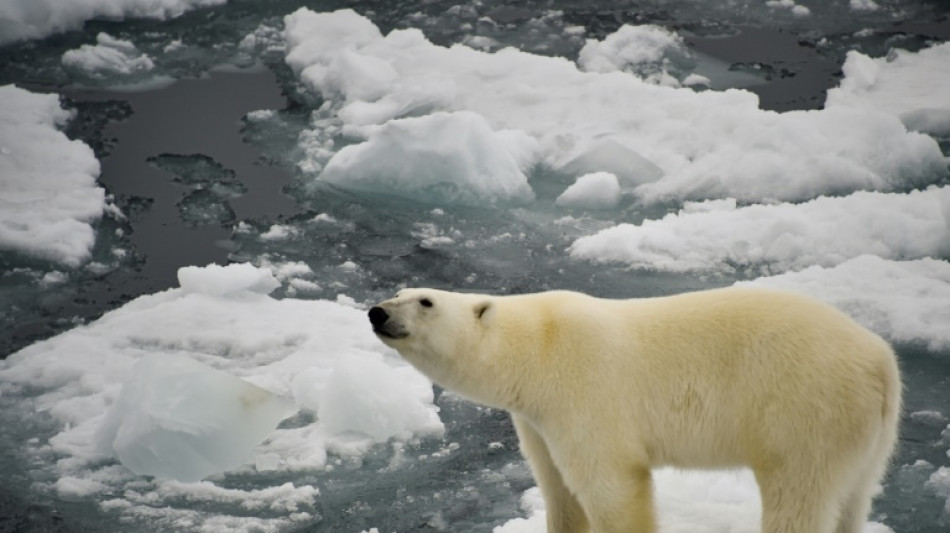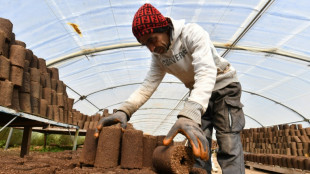
-
 Saka 'ready to go' after long injury lay-off: Arteta
Saka 'ready to go' after long injury lay-off: Arteta
-
Ingebrigtsen Sr, on trial for abusing Olympic champion, says he was 'overly protective'

-
 Tourists and locals enjoy 'ephemeral' Tokyo cherry blossoms
Tourists and locals enjoy 'ephemeral' Tokyo cherry blossoms
-
Khamenei warns of 'strong' response if Iran attacked

-
 France fines Apple 150 million euros over privacy feature
France fines Apple 150 million euros over privacy feature
-
UK PM urges nations to smash migrant smuggling gangs 'once and for all'

-
 Thai authorities probe collapse at quake-hit construction site
Thai authorities probe collapse at quake-hit construction site
-
France's Le Pen convicted in fake jobs trial

-
 Chinese tech giant Huawei says profits fell 28% last year
Chinese tech giant Huawei says profits fell 28% last year
-
Trump says confident of TikTok deal before deadline

-
 Myanmar declares week of mourning as hopes fade for quake survivors
Myanmar declares week of mourning as hopes fade for quake survivors
-
Japan's Nikkei leads hefty market losses, gold hits record

-
 Tears in Taiwan for relatives hit by Myanmar quake
Tears in Taiwan for relatives hit by Myanmar quake
-
Venezuela says US revoked transnational oil, gas company licenses

-
 'Devastated': Relatives await news from Bangkok building collapse
'Devastated': Relatives await news from Bangkok building collapse
-
Arsenal, Tottenham to play pre-season North London derby in Hong Kong

-
 Japan's Nikkei leads hefty equity market losses; gold hits record
Japan's Nikkei leads hefty equity market losses; gold hits record
-
Israel's Netanyahu picks new security chief, defying legal challenge

-
 Trump says US tariffs to hit 'all countries'
Trump says US tariffs to hit 'all countries'
-
Prayers and tears for Eid in quake-hit Mandalay

-
 After flops, movie industry targets fresh start at CinemaCon
After flops, movie industry targets fresh start at CinemaCon
-
Tsunoda targets podium finish in Japan after 'unreal' Red Bull move

-
 French chefs await new Michelin guide
French chefs await new Michelin guide
-
UK imposes travel permit on Europeans from Wednesday

-
 At his academy, Romanian legend Hagi shapes future champions
At his academy, Romanian legend Hagi shapes future champions
-
Referee's lunch break saved Miami winner Mensik from early exit

-
 Djokovic refuses to discuss eye ailment after shock Miami loss
Djokovic refuses to discuss eye ailment after shock Miami loss
-
Mitchell magic as Cavs bag 60th win, Pistons and T'Wolves brawl

-
 Mensik shocks Djokovic to win Miami Open
Mensik shocks Djokovic to win Miami Open
-
Duterte lawyer: 'compelling' grounds to throw case out

-
 What happens on Trump's 'Liberation Day' and beyond?
What happens on Trump's 'Liberation Day' and beyond?
-
Clock ticks on Trump's reciprocal tariffs as countries seek reprieve

-
 Japan-Australia flagship hydrogen project stumbles
Japan-Australia flagship hydrogen project stumbles
-
Musk deploys wealth in bid to swing Wisconsin court vote

-
 Mensik upsets Djokovic to win Miami Open
Mensik upsets Djokovic to win Miami Open
-
China manufacturing activity grows at highest rate in a year

-
 'Waited for death': Ex-detainees recount horrors of Sudan's RSF prisons
'Waited for death': Ex-detainees recount horrors of Sudan's RSF prisons
-
Japan's Nikkei leads big losses in Asian markets as gold hits record

-
 Rescue hopes fading three days after deadly Myanmar quake
Rescue hopes fading three days after deadly Myanmar quake
-
'Basketbrawl' as seven ejected in Pistons-Wolves clash

-
 Four men loom large in Microsoft history
Four men loom large in Microsoft history
-
Computer pioneer Microsoft turns 50 in the age of AI

-
 Trump calls out both Putin and Zelensky over ceasefire talks
Trump calls out both Putin and Zelensky over ceasefire talks
-
Kim Hyo-joo tops Vu in playoff to win LPGA Ford Championship

-
 Economy and especially Trump: Canadians' thoughts on campaigns
Economy and especially Trump: Canadians' thoughts on campaigns
-
Liberal PM Carney takes lead four weeks before Canada vote

-
 SpaceX to launch private astronauts on first crewed polar orbit
SpaceX to launch private astronauts on first crewed polar orbit
-
Australia open door for Kerr's return as Matildas captain

-
 The Premier League's unlikely pretenders to Champions League riches
The Premier League's unlikely pretenders to Champions League riches
-
IFabric Corp Reports Record Q4 and Full Year 2024 Revenues and Strong Profitability


UN holds biodiversity talks on deal to stave off mass extinction
Global efforts to cut plastic and agricultural pollution, protect a third of wild spaces, and ultimately live "in harmony with nature" will dominate UN biodiversity negotiations starting Monday, held in person after a two-year pandemic delay.
Almost 200 countries are due to adopt a global framework this year to safeguard nature by mid-century from the destruction wrought by humanity, with a key milestone of 30 percent protected by 2030.
The aim is also to safeguard the "services" nature supplies: the air we breathe, the water we drink, the soil that yields the food we eat.
The meeting in Geneva will set the stage for a crucial UN biodiversity summit, initially due to be held in China in 2020 and postponed several times. It is now expected to take place at the end of August.
Geneva is a chance to strengthen a draft global biodiversity agreement "that many observers feel currently lacks the teeth needed to meaningfully address interconnected biodiversity and climate crises that cannot be solved in isolation", according to the Nature Conservancy.
Campaigners have for years called for a deal on halting biodiversity loss similar to what the Paris Agreement outlined for the climate.
Previous efforts to halt this devastation have fallen short, with countries failing, for example, to meet almost all the biodiversity targets set in 2010.
But despite often being overshadowed by the efforts to combat climate change, the plight of the natural world is no less catastrophic.
Intensive agriculture is depleting the soil and fouled waterways, oceans are overfished, plastics and other pollutants are invading ecosystems and threatening our health.
And now climate change is a growing threat that could compound all of these problems.
Last month, the UN's Intergovernmental Panel on Climate Change warned that nine percent of all the world's species will likely be "at high risk" of extinction even if warming is capped at the ambitious Paris target of 1.5 degrees Celsius.
In 2019, a report by UN biodiversity experts said one million species could disappear in the coming decades, raising fears that the world is entering its sixth era of mass extinction in the last half-billion years.
"We only know of about 10 percent of the species that exist on Earth. Some disappear without even having been described, nor ever seen by any human being," Anne Larigauderie, executive secretary of the Intergovernmental Science-Policy Platform on Biodiversity and Ecosystem Services (IPBES), told AFP.
- Ambition -
The United Nations Convention on Biological Diversity (CBD) is aiming to reverse that trend with its global framework.
This round of negotiations began in Rome in February 2020 and was swiftly brought to a halt by the Covid-19 pandemic, though online sessions continued and a draft text was finished in 2021.
It is hoped the in-person meeting in Geneva will move the process closer to a global deal at the UN's COP15 summit in China.
"Will we be able to settle everything? That's the big question," Basile van Havre, one of the two co-chairs of the negotiations, told AFP.
The draft outlines some twenty targets for 2030, including the high-profile ambition to protect at least 30 percent of the Earth's land and water habitats.
It also outlines objectives on reducing the amount of fertilisers and pesticides discharged into the environment and cutting at least $500 billion per year of subsidies harmful to Nature and ecosystems.
But as it stands, Guido Broekhoven of WWF said, the text is "not ambitious and comprehensive enough to address the current biodiversity crisis".
Observers will judge whether the mechanisms put in place -- such as monitoring and enforcement -- correspond to the targets set, said Sebastien Treyer, director general of the IDDRI think tank.
There will also be significant attention on the "mobilisation of financial resources", which are of particular importance to the Global South, he said.
Even the goal of the so-called High Ambition Coalition to protect 30 percent of the planet by 2030 might not be enough, observers said.
"If we do not tackle the indirect causes (of biodiversity loss), in particular production and consumption, there will always be strong erosion," said Juliette Landry, a researcher at IDDRI.
D.Cunningha--AMWN

